Anjaparidze Veriko (Vera)

Veriko Anjaparidze (Vera) (b. October 5, 1897, Kutaisi – d. January 30, 1987, Tbilisi) was an actor, People's Artist of Georgia (1943) and USSR (1950), the winner of the USSR State Prize (1943, 1946, 1952), Hero of Socialist Labour (1979) Shota Rustaveli Prize (1979) and K. Marjanishvili Prize (1975), one of the founders of modern Georgian theatre.
Anjaparidze was born in the family of a notary. After graduating from St. Nino's School in Kutaisi, she studied in the drama studios of S. Aidarov (1916–1917) in Moscow and G. Jabadari (1918–1920) in Tbilisi.
In 1920–1926, Anjaparidze was an actress at the Rustaveli Theatre, in 1926–1928 — at the Batumi Theatre and Workers' Theatre in Tbilisi, in 1928–1932 — at Kutaisi-Batumi Academic Drama (director K. Marjanishvili). In 1932–1933, she worked at the Realistic Theatre in Moscow, where she played the role of Sofia in M. Gorky's Mother.
In 1933, she returned to Tbilisi, to the K. Marjanishvili Theatre, where she worked until the end of her life (in 1957–1959, she was the director and artistic director of the theatre). Anjaparidze was a very distinctive actress. She had a keen sense of modernity. Tragic and dramatic faces portrayed by Anjaparidze were characterized by high pathos, great lyricism, clarity of scenic design.
Anjaparidze was distinguished by great stage charm, passion, melodious speech, virtuoso technique. Realistic and romantic traditions of Georgian theatre were developed in her work. Many productions of the K. Marjanishvili State Academic Theatre are connected to Anjaparidze's name. During the 60 years she worked at this theatre, Anjaparidze created a whole gallery of highly artistic stage faces. Among them: Ophelia (W. Shakespeare's Hamlet), Judith (K. Gutzkow's Uriel Acosta), Desdemona (W. Shakespeare's Othello), Lizzie (N. Shiukashvili's The Fool), Ginatre (Sh. Dadiani's Ninoshvili's Guria), Marguerite (A. Dumas's The Lady of the Camellias), Aishe (I. Vakeli's Envy), Javara (Vazha- Pshavela's Mokvetili), Makvala (A. Kazbegi's Confessor), Cleopatra (W. Shakespeare's Antony and Cleopatra), Darejani (I. Mosashvili's Their Star, USSR State Prize, 1952), Countess (P. Beaumarchais's The Marriage of Figaro), Mary Stuart (F. Schiller's Mary Stuart), Medea (Euripides's Medea), Grandmother (A. Casona's Los árboles mueren de pie), Zeinab (A. Sumbatashvili's The Betrayal), Mrs. Alving (H. Ibsen's Ghosts), Nene (P. Zindel's Daisy), Lady Macbeth (W. Shakespeare's Macbeth), Miss Higgins (B. Shaw's Pygmalion) and others.
Anjaparidze made a significant contribution to the development of Georgian and Soviet cinema. From 1925, she gave life to unique screen faces: Maro (Saba, directed by M. Chiaureli, 1929), Luisa (Komunaris Chibukhi, directed by K. Marjanishvili, 1929), Manana (Arsena, 1937), Babale (Qadjana, directed by K. Pipinashvili, 1944), Rusudani (Giorgi Saakadze, USSR State Prize 1943, 1946), Hans's Mother (The Fall of Berlin, “Mosfilm”, 1949), Otar's Widow (Otar's Widow, directed by M. Chiaureli, 1958), Princess (You Cannot See What I Had Seen, directed by M. Chiaureli, 1965), Passenger (Repentance, directed by T. Abuladze, 1984), Vardo (The Legend of Suram Fortress, directed by Sh. Abashidze, S. Farajanova, 1984), Rusudan (Family, directed by N. Janelidze , 1985) and others. Veriko Anjaparidze (1976), the film about her life and work, was directed by R. Chiaureli.
Anjaparidze was a master of artistic reading. She worked as a director at the Georgian Theatre Institute and drama studios. She was an active public figure.
In 1980, Anjaparidze was elected as an honorary citizen of Tbilisi.
She received state awards.
She is buried at the Mtatsminda Pantheon of Writers and Public Figures. From 1987, the one-actor theatre “Veriko”, named after V. Anjaparidze, was established under the direction of K. Makharadze.
Literature: აფხაიძე შ., ვერიკო ანჯაფარიძე, თბ., 1956; გუგუშვილი ე., თეატრალური პორტრეტები, თბ., 1966; ვერიკო ანჯაფარიძე. საიუბილეო კრებული, შედგ. ნ. ურუშაძის მიერ, თბ., 1987; ვერიკო ანჯაფარიძე. ალბომი, შედგ. კ. ნინიკაშვილის მიერ, თბ., 1968; «თეატრალური მოამბე», 1987, № 1; მეტრეველი ს. ვერიკო ანჯაფარიძის ფენომენი, წგ. თამაშის ხელოვნება, თბ., 2016; ურუშაძე ნ., ვერიკო ანჯაფარიძე, თბ., 2001; Гугушвили Э., Джанелидзе Д., Грузинский государственный драматический театр им. К. А. Марджанишвили, Тб., 1958.


